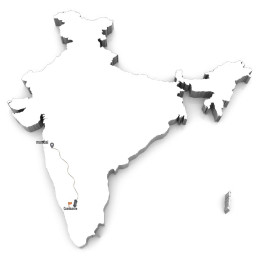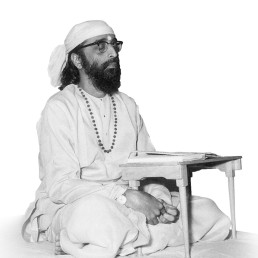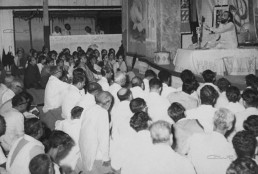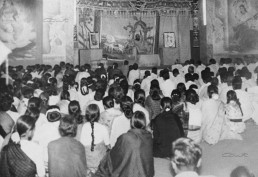
Jnana Yajna 58

Year & Dates:
June 07, 1959 to June 28, 1959

Yajna Topic:
Shrimad Bhagavad Gita- Chapter 15

Place:
Coimbatore, India.
“I discovered the relationship existing between things, but I do not know Who put this relationship into the world.” Thus wondered the theoretical physicist, Albert Einstein, when congratulated for his outstanding scientific achievement in relativity and quantum physics. The sages who studied the Who, its manifestation as the world and the individual, had that Knowledge revealed in their deep study of life and white heat of meditation. That Knowledge Bhagavan Krishna gave in its succinct form as Shrimad Bhagavad Gita, and Pujya Gurudev unlocked its invaluable pages to reveal its great significance for the present: “I am interested in today, now, and not in a postmortem gain. The most important thing to be known of life is – how I am to live in this world, a better, more intelligent, and happy man in this very birth. Today, even with everything at his door, man’s intellect still questions if this is all, and Religion has an answer to this query.”
Enquiry about the Infinite
The venue chosen for the 58th Jnana Yajna in Coimbatore was a palatial hall of a Kalyana Mandap (marriage hall). On the evening of June 7, 1959, the hoisted Om flag signaled that the beautiful hall had acquired a spiritual hue as Pujya Gurudev’s yajnashala. Sri Baburam Saxenner, a Sanskrit scholar and professor of the Allahabad University inaugurated the yajna, and Sri Venkataswami Naidu welcomed the honored guests and Pujya Gurudev. In that packed hall, Pujya Gurudev first clarified the role of religion and philosophy in nation-building: “World is a teamwork, a single event may be the result of infinite causes. And in this universal teamwork, if we do not know how to play the game of life, we will only kick and quarrel and ruin ourselves. Gita tells us our propositions, how they come, and how we must meet them and eke out of them maximum benefit and happiness. But to understand Gita, we must first come to understand the theme of life as such. Now while talking on Gita, I am giving you only suggestions. So, don’t accept them immediately, but independently think and then only come to any conclusion.”
In the morning classes, His richly illustrative Atma Bodha fostered the spirit of enquiry. Pujya Gurudev then unfolded the glory of the Highest Purushottama, the Truth Supreme, knowing which seekers gain real independence from all sorrows of the body, mind, and intellect.
In the Coimbatore Yajna, the other sadhana features of Akhanda Kirtana, Laksharchana, or Havana could not be completed because of an unforeseen time constraint. Nevertheless, the divine vibrations that Pujya Gurudev created through His discourses were powerful enough to keep the aspirants steadfast in their spiritual quest.
Photo Gallery

“Think,” Says Pujya Gurudev
With reference to the perishable, finite, world of constant change, the Spirit is defined there in the Chapter as the imperishable, Infinite, Changeless Factor, which is at once the substratum and the nourishment for the imperfect world-of-plurality. The Infinite is thus defined as the imperishable (Akshara) with reference to the perishable (Kshara) equipment of matter. After thus indicating the antithesis of change as changeless he will explain how the experiencer of the changes, being Infinite, is even something other than that which we know as the change and the changeless. This Unconditioned Eternal Factor, is called by the Geeta as the Purushottam.
From Tyagi Magazine
Your only Greatest Enemy!
In this enlightening discourse, Swamiji reveals the insidious nature of Maana (pride) and Moha (vanity), showing how they can become formidable obstacles on the path to self-realization. Discover how to recognize and overcome these inner enemies, leading to true freedom and spiritual awakening.


